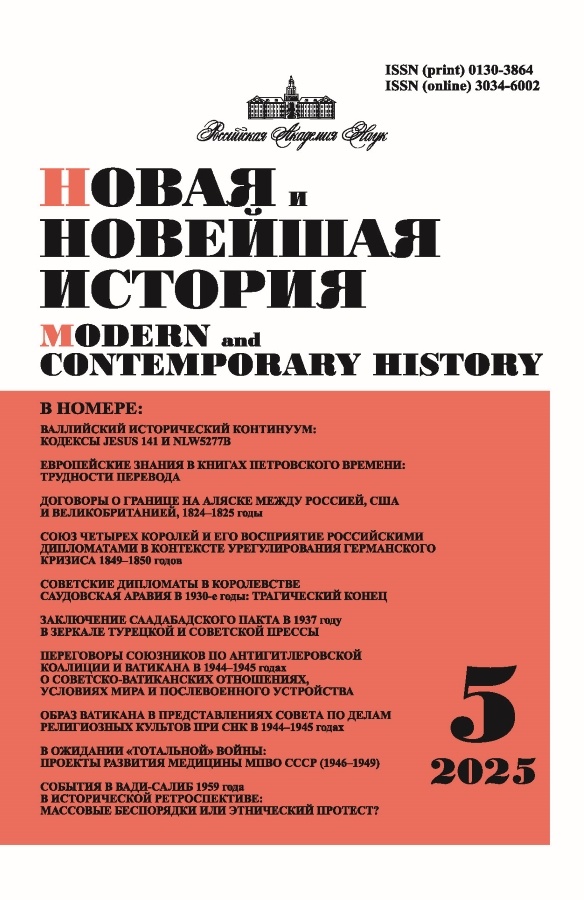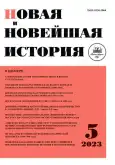Наполеон Бонапарт, генерал Жан-Батист Журдан и проблема бандитизма в Пьемонте (1800–1802)
- Авторы: Митрофанов А.А.1
-
Учреждения:
- Институт всеобщей истории Российской Академии наук
- Выпуск: № 5 (2023)
- Страницы: 34-47
- Раздел: Новое время
- URL: https://gynecology.orscience.ru/0130-3864/article/view/670924
- DOI: https://doi.org/10.31857/S013038640028068-2
- ID: 670924
Цитировать
Полный текст
Аннотация
Период Консульства Наполеона Бонапарта нередко представляют как время его политического триумфа как политика и законодателя. Но эта весьма стереотипная оценка требует новых уточнений. Как показывают новейшие исследования, весь период между брюмером и провозглашением Империи был временем трудного поиска новых методов управления в очень тяжелых обстоятельствах. Одной из серьезных проблем при формировании новых границ наполеоновской Франции в первые годы XIX в. оставался бандитизм. Цель статьи – проанализировать пути решения проблемы бандитизма в контексте общей наполеоновской политики, показать роль французской администрации и, в частности, генерала Ж.-Б. Журдана в этом процессе в период формирования новых институтов власти в период Консульства. На основе фондов министерств общей полиции и юстиции Франции, фонда генеральной администрации Пьемонта из Национального архива Франции, а также некоторых материалов из фондов Архива министерства иностранных дел Франции делается попытка реконструкции комплекса мер по искоренению бандитизма. Новым властям, и прежде всего генеральному администратору Пьемонта генералу Журдану, а также префектам, мэрам коммун приходилось не только прибегать к тактике использования «мобильных колонн» и чрезвычайного правосудия, но и искать компромисс с сельскими олигархиями, приходским духовенством и крестьянскими массами, чтобы поддерживать хрупкий общественный порядок. Важно и то, что полученный французами опыт в борьбе с бандитизмом в Пьемонте впоследствии был успешно распространен в других регионах Италии и что именно он во многом послужил основой для формирования политики наполеоновского «культурного империализма».
Об авторах
Андрей Александрович Митрофанов
Институт всеобщей истории Российской Академии наук
Автор, ответственный за переписку.
Email: paxgallica@gmail.com
ORCID iD: 0000-0002-8480-5345
Российская Федерация, Москва
Список литературы
- Бондарчук В.С. Итальянское крестьянство в XVIII в. Аграрные отношения и социальное движение в Сардинском королевстве. М., 1980.
- Коротков С.Н. «Законы более жестокие, чем сама война». О политическом значении амнистии Бонапарта эмигрантам // Французский ежегодник. 2006. М., 2006. С. 168–180.
- Митрофанов А.А. Мятежная Савойя: от «великой ферментации» до французской оккупации 1791–1792 гг. По материалам АВПРИ // Французский ежегодник. 2018. М., 2018. С. 78–92.
- Митрофанов А.А. Движение барбэ в эпоху Французской революции: крестьяне, контрреволюционеры, бандиты? // Электронный научно-образовательный журнал «История». 2021. Т. 12. Вып. 7 (105). URL: https://history.jes.su/s207987840015439-1-1/ (дата обращения: 10.01.2023).
- Митрофанов А.А. Проблема «бандитизма» эпохи Директории в современной французской историографии // Французский ежегодник. 2022. Т. 55. М., 2022. C. 356–370.
- Митрофанов А.А. «Альпийская Вандея». Трансформация народного протеста в Савойе 1793 года // Новая и новейшая история. 2022. № 5. С. 6–73. doi: 10.31857/S013038640019935-6
- Форрест А. За кромкой поля боя. Жизнь военных во времена Революционных и Наполеоновских войн. М., 2022.
- Чудинов А.В. Народы против Французской революции // Французский ежегодник. 2016. М., 2016. C. 5–35.
- Boudon J.-O. L’Empire des polices. Comment Napoléon faisait régner l’ordre. Paris, 2017.
- Bourguet-Rouveyre J. Jean-Baptiste Jourdan et le Consulat // La plume et le sabre / Sous la dir. M. Biard, A. Crépin, B. Gainot. Paris, 2002. P. 455–463.
- Boyer F. Carlo Bossi et l’Administration Générale du Piemont (1800–1802) // Rassegna storica del Risorgimento. 1969. № 77. Р. 44–57.
- Boyer F. L'esprit public au Piémont en l'an X et en l'an XI // Revue de l'Institut Napoléon. 1969. Avril. P. 149–157.
- Broers M. Napoleonic Imperialism and the Savoyard Monarchy 1773–1821. State Building in Piedmont. Lewiston [N.Y.], 1997.
- Broers M. The Napoleonic Empire in Italy, 1796–1814. Cultural Imperialism in a European Context? London, 2005.
- Broers M. Napoleon’s other war. Bandits, rebels and their pursuers in the Age of Revolutions. Oxford, 2010.
- Brown H.G. From Organic Society to Security State: The war on brigandage in France 1797–1802 // Journal of Modern History. 1997. № 69. Р. 661–695.
- Brown H.G. Ending the French Revolution: Violence, Justice, and Repression from the Terror to Napoleon. Charlottesville, 2006.
- Clay S. Le brigandage en Provence du Directoire au Consulat (1795–1802) // Du Directoire au Consulat. Brumaire dans l’histoire du lien politique et de l’état-nation. Lille, 2001. T. III. P. 67–89.
- Clay S. Justice, vengeance et passé révolutionnaire: les crimes de la terreur blanche // Annales historiques de la Révolution française. 2007. № 350. Р. 109–133.
- Collini A. Il tramonto di un sogno. La fine dell’ideologia giacobina in Canavese (1800–1802). Torino, 2017.
- Correspondance générale publiée par la Fondation Napoléon. Pacifications. T. III. Paris, 2006.
- Davico R. Prix et conjoncture: la “période” napoléonienne en Piémont. Quelques réflexions au sujet d'une crise // Revue Historique. 1972. T. 248. Fasc. 1 (503). P. 25–48.
- Davis J.A. Conflict and control: law and order in Nineteenth-century Italy. New Jersey, 1988.
- Fischer L.J. Jacobin General. Jean Baptiste Jourdan and the French Revolution 1792–1799. Vol. I–II. Louisiana State University and Agricultural and Mechanical College. Historical Dissertations and Theses. [S. l.], 1978.
- Forrest A. Déserteurs et insoumis sous la Révolution et l’Empire. Paris, 1988.
- Forrest A. Deserteurs et brigands sous la Revolution et l'Empire: état de la question // Les brigands. Criminalité et protestation politique (1750–1850). Rennes, 2013. P. 91–106.
- Grab A. State power, brigandage and rural resistance in Napoleonic Italy // European History Quarterly. 1995. Vol. 25. P. 39–70.
- Hulot F. Le maréchal Jourdan. Paris, 2010.
- Iafelice M. Barbets! La résistance à la domination française dans le pays niçois 1792–1814. Nice, 1998.
- Jourdan J.-B. Le Dix-Huit Brumaire. Extrait des Mémoires du général Jourdan, communiqué par le vicomte de Grouchy // Le Carnet historique et littéraire: revue mensuelle, rétrospective et littéraire. 1901. Février. P. 161–172.
- Lignereux A. Les Impériaux. Administrer et habiter l'Europe de Napoléon. Paris, 2019.
- Marion M. Le brigandage pendant la Révolution. Paris, 1935.
- Rao A.-M. Il patriottismo repubblicano di Carlo Botta // Il Giacobino pentito. Carlo Botta fra Napoleone e Washington. Roma, 2010. P. 229–246.
- Ricuperati G. Lo Stato sabaudo nel Settecento: dal trionfo delle burocrazie alla crisi d'antico regime. Torino, 2001.
- Ruggiero M. I briganti di Piemonte Napoleonico. Torino, 1968.
- Ruggiero M. La rivolta dei contadini piemontesi (1796–1802). Torino, 1974.
- Ruggiero M. Anno del fuoco 1799. I cosacchi e la massa cristiana in Piemonte. Pinerolo, 1999.
- Ruggiero M. La Carmagnola. Rivoluzione Francese in Piemonte (1796–1799). Torino, 2018.
- Sottocasa V. Les brigands et la Revolution. Violences politiques et criminalité dans le Midi (1789–1802). Ceyzerieu, 2016.
- Vaccarino G. I giacobini piemontesi (1794–1814). T. I–II. Roma, 1989.
- Valentin R. Le maréchal Jourdan. Paris, 1956.
- Zanotto A. Témoignages et documents pour l'histoire de la Vallée d'Aoste pendant la Révolution et l'Empire // Société académique, religieuse et scientifique du duché d'Aoste. Bulletin. 1965. № 42. P. 183–266.
Дополнительные файлы








